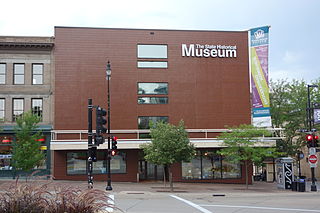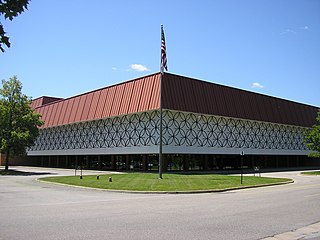
The Institute of Texan Cultures is a museum and library operating as a component of The University of Texas at San Antonio. The building which housed the institute is a striking example of Brutalist architecture, and was listed on the National Register of Historic Places in 2024.
Empire Air Force Station is a former United States Air Force Aerospace Defense Command (ADC) long range radar site located 0.7 miles (1.1 km) south-southeast of Empire, Michigan, in Empire Township. It was closed in 1978 by the Air Force, and turned over to the Federal Aviation Administration (FAA).

The Wisconsin Historical Society is simultaneously a state agency and a private membership organization whose purpose is to maintain, promote and spread knowledge relating to the history of North America, with an emphasis on the state of Wisconsin and the trans-Allegheny West. Founded in 1846 and chartered in 1853, it is the oldest historical society in the United States to receive continuous public funding. The society's headquarters are located in Madison, Wisconsin, on the campus of the University of Wisconsin–Madison.

The Library of Michigan is the state library of the U.S. state of Michigan, located in the state capital, Lansing. It is housed in the 5-story Michigan Library and Historical Center building. The library's purpose is to collect and preserve Michigan publications, conduct reference and research, and support libraries statewide.

The Museum of disABILITY History is a museum related to the history of people with disabilities from medieval times to the present era. At its premises at 3826 Main Street in Buffalo, New York, US, it was the only "brick-and-mortar" museum in the United States dedicated exclusively to preserving the history of people with disabilities. The bricks-and-mortar museum closed in December 2020, but the museum continued operating as of 2024 as a virtual museum.

The Detroit Public Library is the second largest library system in the U.S. state of Michigan by volumes held and the 12th-largest public library system in the United States. It is composed of the Main Library on Woodward Avenue, which houses the library's administration offices, and 23 branch locations across the city. The Main Library is part of Detroit's Cultural Center Historic District listed in the National Register of Historic Places adjacent to Wayne State University campus and across from the Detroit Institute of Arts.

The Rhode Island Historical Society is a privately endowed membership organization, founded in 1822, dedicated to collecting, preserving, and sharing the history of Rhode Island. Its offices are located in Providence, Rhode Island.

(Scene) Metrospace is an alternative arts space located in downtown East Lansing, Michigan, featuring a variety of contemporary artworks. (Scene) also hosts a wide variety of musical performances by local and national artists. It is a project created in response to Governor Jennifer Granholm's Cool Cities Initiative.

The Senator John Heinz History Center, an affiliate of the Smithsonian Institution, is the largest history museum in the Commonwealth of Pennsylvania, United States. Named after U.S. Senator H. John Heinz III (1938–1991) from Pennsylvania, it is located in the Strip District of Pittsburgh.

The Michigan Science Center(MiSci) is a Smithsonian-affiliate science museum in Detroit, Michigan. The mission of the Michigan Science Center is to inspire curious minds of all ages to discover, explore and appreciate science, technology, engineering and math (STEM) in a creative, dynamic learning environment. As a 501(c)(3) nonprofit organization, MiSci relies on the generous support of donors, sponsors, community partners and members.

The Detroit Historical Museum is located at 5401 Woodward Avenue in the city's Cultural Center Historic District in Midtown Detroit. It chronicles the history of the Detroit area from cobblestone streets, 19th century stores, the auto assembly line, toy trains, fur trading from the 18th century, and much more.

The Wisconsin Historical Museum is a museum located on the Capitol Square in Madison, Wisconsin. It is currently open only for retail shopping featuring books, gifts, and other items focusing on Wisconsin and history.
The Great Lakes Quilt Center is the Michigan State University Museum’s center for quilt-related research, education, and exhibition activities. While the museum, established in 1857, has long held significant collections, its focus of activities on quilt scholarship and education began with the launch of the Michigan Quilt Project at the museum in 1984. The Michigan Quilt Project not only spearheaded the documentation of the state's quiltmaking history, but also stimulated interest in strengthening the museum's quilt collection, upgrading its care, and expanding its use. As of 2008, the Michigan Quilt Project has collected documentation on over 9000 quilts in the state and the collection of quilts numbers over 700 with significant examples from Michigan and the Great Lakes region, examples of quilts from numerous African countries, major ethnographic collections of Native American quilts and Michigan African American quilts, and special collections assembled by Kitty Clark Cole, Harriet Clarke, Merry and Albert Silber, Deborah Harding, and Betty Quarton Hoard. The MSU Museum also houses two important collections developed by pioneering American quilt historians Cuesta Benberry and Mary Schafer.

The Spellman Museum of Stamps and Postal History, originally known as the Cardinal Spellman Philatelic Museum, is a not-for-profit organization dedicated to the appreciation of diversity through the medium of postage stamps and postal history.
The Schenectady County Historical Society, located in Schenectady, New York, was established on July 14, 1905, under the Membership Corporation Laws of the State of New York. The Society is an independent not-for-profit corporation, not a unit of government. Today, the Schenectady County Historical Society brings to life the region's history through exhibits, talks, workshops, concerts, programs and community events at their three sites: Mabee Farm Historic Site, the Grems-Doolittle Library and the Schenectady History Museum, and the historic Brouwer House Creative.

The Chemung County Historical Society is headquartered in the historic Chemung Canal Bank Building in Elmira, New York. It is dedicated to the collection, preservation, and presentation of the history of the Chemung River Valley region. The society was founded in 1923 and first chartered by New York State in 1947. It is accredited by the American Alliance of Museums, and currently operates two cultural repositories, the Chemung Valley History Museum and the Booth Library, both as non-profit educational institutions.

The Michigan Hall of Justice, also known as the Michigan Supreme Court Building is a six-story structure at 925 Ottawa Street in Lansing, Michigan. An example of monumental neoclassicism, the Hall of Justice was designed by Spillis Candella DMJM and Albert Kahn Associates, Inc.
The South Dakota State Historical Society is South Dakota's official state historical society and operates statewide but is headquartered in Pierre, South Dakota at 900 Governors Drive. It is a part of the South Dakota Department of Education.

The Worcester Historical Museum, located in downtown Worcester, Massachusetts, was founded in 1875 as the Worcester Society of Antiquity. This museum is the only institution in the area devoted entirely to local history and artifacts. The scope of their collection ranges from colonial to twentieth-century, encompassing manuscripts, textiles, paintings, and ceramics. The museum is made up of permanent and temporary exhibits, a research library, and currently owns and operates the local Salisbury Mansion. The library maintains more than 7,000 titles.

Midland Center for the Arts is a performing arts center and museum complex located in on 1801 Saint Andrews St in Midland, Michigan. It includes two performance venues, two museums, art studios, lecture halls and a historical campus. The member groups at the center are the Alden B. Dow Museum of Science & Art, Center Stage Choirs, Center Stage Theatre, MATRIX:MIDLAND, Midland County Historical Society and Midland Symphony Orchestra.

















